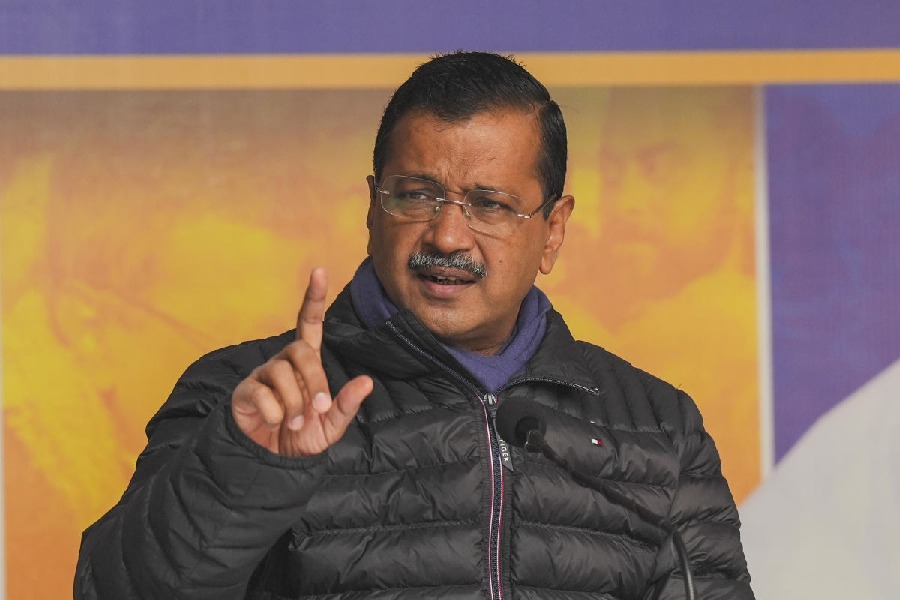The Delhi High Court castigated the AAP government on Thursday, asking if it could explain to those who had lost their near and dear ones to COVID-19 in the last 18 days why the administration did not take steps when cases were spiralling in the national capital.
The high court, which also asked the government to look at the situation with a "magnifying glass", observed that it was "disheartening" to see that the number of daily deaths due to the virus had increased to 131 and fresh COVID cases have risen to 7,486.
Pulling up the Delhi government, a bench of Justices Hima Kohli and Subramonium Prasad asked why it waited till the court intervened to take steps such as reducing the number of people attending weddings to 50 to prevent the spread of COVID-19.
"You (Delhi government) saw from November 1 which way the wind was blowing. But you turn turtle now because we asked you some questions. The bell should have rung loud and clear when the numbers were spiralling. Why did you not wake up when you saw the situation was deteriorating?
"Why did we have to shake you out of your slumber on November 11? What did you do from November 1 till November 11? Why did you wait 18 days (till November 18) to take a decision. Do you know how many lives were lost during this period? Can you explain it to those who lost their near and dear ones," the bench asked.
It also noted that Delhi government statements, with regard to the rising COVID cases, to the Press appear to be contrary to the submissions made in court.
The bench said that while Delhi government ministers were giving Press statements to the effect that third wave of COVID infections had reached its peak and the numbers were going down, the same "is not reflected" in the daily figures and the status report before the court.
"We can take judicial note of the statements your ministers are making," the bench told senior advocate Sandeep Sethi and Delhi government additional standing counsel Satyakam, who were representing the AAP government.
The bench also noted that crematoriums were "overflowing" and "funeral pyres were burning throughout the night" and asked the Delhi government whether adequate arrangements were in place to cremate or bury the rising number of people succumbing to COVID-19.
It said that Delhi government ought to reduce its reliance on the Rapid Antigen Testing (RAT) and focus on increasing tests by the more accurate RTPCR method as more and more asymptomatic persons are testing positive and the number of COVID-19 cases are spiralling in the city. "Delhi government should have been alive to the fact that RAT is not effective," it said.
RT/PCR, short for Reverse Transcription Polymerase Chain Reaction, is a laboratory technique widely used in the diagnosis of genetic diseases and to measure gene expression in research.
The bench directed the Delhi government to file a status report, before the next date of hearing on November 26, indicating the funeral/burial arrangements, increase of ICU beds in its hospitals by an additional number of 663 and number of care homes for accommodating those who cannot home quarantine themselves.
Fines not a deterrent
On implementation of social distancing norms, prevention of spitting and wearing of masks, the court was not satisfied with the monitoring being done by the Delhi government in some districts where COVID-19 numbers were high.
The bench also said the fines being imposed -- Rs 500 for first violation and Rs 1,000 for every subsequent violation -- did not appear to be a deterrent.
It said there appeared to be substantial disparity in monitoring and imposition of fines in certain districts as compared to others. "What kind of monitoring and marshalling are you doing? Look at the situation seriously with a magnifying glass. You have crossed cities like New York and Sao Paolo," the court said.
The high court was hearing a PIL by advocate Rakesh Malhotra seeking increase in the COVID-19 testing numbers in the national capital and getting speedy results.
Situation ‘alarming’
The court on November 11 had pulled up the Delhi government for relaxing norms for public movement and gatherings even as COVID-19 cases were increasing with no household "left untouched", and sought to know if it had any policy or strategy in place to deal with the "alarming" situation.
It had directed the Delhi government to file a status report explaining steps taken by it in the last two weeks, when the COVID-19 cases have risen alarmingly, to contain the spread of the infection.
Govt status report
In its latest status report filed on Wednesday, the Delhi government said that it was not allowing all the activities, like reopening of schools, higher educational institutions and swimming pools, that have been permitted by the Central government.
It also told the court that it banned bursting of firecrackers during Diwali with the view to prevent increase in air pollution and crowding of people and also prohibited celebration of Chhath Puja in public places, open grounds, river banks and temples.
The Delhi government also told the court that it had approached the Centre seeking its sanction for closing certain markets in the city during certain days or hours of a week.
It told the court that it was alive to the situation and was making every effort to arrest the spread of COVID-19.
However, the bench said that whatever the Delhi government was doing was not enough in the prevailing situation.










